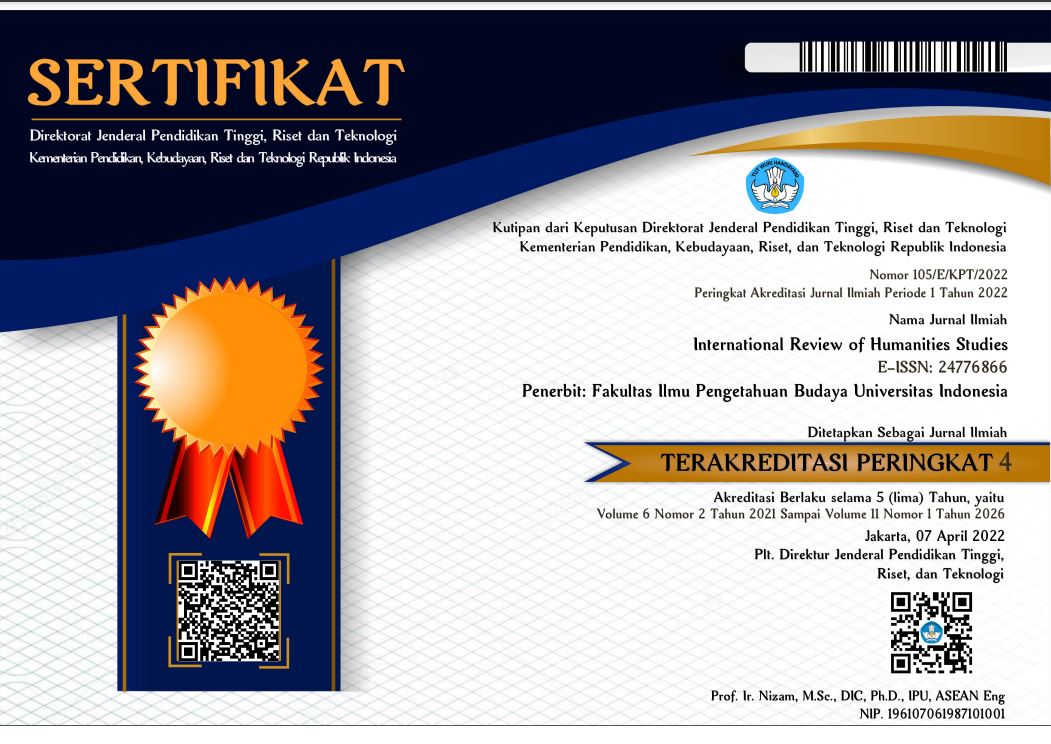International Review of Humanities Studies

Abstract
This study analyzes the term of address ustad in Indonesian culture. Indonesia’s religious-themed movies may represent the use of the term of address ustad in daily conversation. In particular, this study aims to describe the patterns of form, the patterns of use, and the social values of the term of address ustad in film utterances. The data of the term of address ustad and its contexts are collected from the utterances in Indonesia’s four Islamic-themed movies. This descriptive qualitative study uses sociopragmatics approach in identifying the functions of the term of address in film discourse. The context of the utterances that contain the term of address ustad is identified using Hymes’ (1972) S.P.E.A.K.I.N.G model. This study concludes that: (1) form patterns of the term of address ustad include incomplete form ‘Stad’; title ‘Ustad’; kinship term + title, e.g. ‘Pak Ustad’, and title + personal name, e.g. ‘Ustad Syamsul’; (2) the term of address ustad has two functions: showing respect and showing closeness; (3) there are six characteristics of people who are commonly addressed as ustad in Indonesia, including Quran private teachers, prayer leaders, teachers in pesantrens (Islamic boarding schools), Islamic preachers in mosques, Islamic preachers in television shows, and pesantren leaders in villages; (4) the terms of address ustad is a title held at any time regardless of the situation. An ustad is still addressed as ustad even though he is not preaching at that moment.
References
Abuamsha, Duaa. (2010). Terms of Address in Palestinian Arabic (Master’s thesis, Ball State University, Muncie, Indiana, United States). Retrieved from http://cardinalscholar.bsu.edu/handle/123456789/193706. Accessed on 17 June 2019.
Achmad, Gandhi. (2019). “Polisi kembali proses kasus dugaan pencabulan Ustaz RA”. GatraCom. Retrieved from https://www.gatra.com/detail/news/431667/millennials/polisi-kembali-proses-kasus-dugaan-pencabulan-ustaz-ra. Accessed on 28 July 2019.
Alharbi, Tahani Ateeqallah A. (2015). A Socio-pragmatic Study of Forms of Address and Terms of Reference in Classical Arabic as Represented in the Chapter of Joseph in the Holy Quran (Doctoral Dissertation, The University of Leeds, United Kingdom). Retrieved from http://etheses.whiterose.ac.uk/11127/. Accessed on 17 June 2019.
Alwi, Hasan, Dardjowidjojo, Soenjono, Lapoliwa, Hans, & Moeliono, Anton M. (2010). Tata Bahasa Baku Bahasa Indonesia Edisi Ketiga. Jakarta: Pusat Bahasa dan Balai Pustaka.
Aminuddin. (2018). “Bahar bin Smith ditahan karena kasus penganiayaan, ini kisahnya”. Tempo.Co. Retrieved from https://nasional.tempo.co/read/1156701/bahar-bin-smith-ditahan-karena-kasus-penganiayaan-ini-kisahnya?page_num=2. Accessed on 18 June 2019.
Al-Qudah, Mahmoud. (2017). The Jordanian terms of address: Asocio-pragmatic study. SHS Web of Conference, Vol. 37, August 2017.
Braun, Friederike. (1988). Terms of Address: Problems of Patterns and Usage in Various Languages and Cultures. Berlin, German: Mouton de Gruyter. Gusdian,
Rosalin Ismayoeng. (2016). Penggunaan kata sapaan oleh pembawa acara Apa Kabar Indonesia (AKI) di TV One. Kembara, Vol. 2, No. 2, pp.212-215.
Hairani, Linda. (2014). “Polisi belum juga periksa Ustad Guntur Bumi”. Tempo.Co. Retrieved from https://seleb.tempo.co/read/574817/polisi-belum-juga-periksa-ustad-guntur-bumi/full&view=ok. Accessed on 18 June 2019.
Holmes, Janet. (2008). An Introduction to Sociolinguistics. London: Pearson Longman.
Hymes, Dell. (1972). “Models of the interaction of language and social life”. In John Gumperz, & Dell Hymes (eds), Directions in Sociolinguistics: The Ethnography of Communication (pp. 35-71). New York: Holt,
Rinehart and Winston. Retrieved from https://english.okstate.edu/pages/336-socio-5173-readings. Accessed on 17 June 2019. Keshavarz,
Mohammad Hossein. (2001). The role of social context, intimacy, and distance in the choice of forms of address. International Journal of Sociology of Language, Vol. 2001, Issue 148, pp.5-18.
Kridalaksana, Harimurti. (1978). Second participant in Indonesian address. In Harimurti Kridalaksana (Ed.) Beberapa Masalah Linguistik Indonesia (pp.77-90). Jakarta: Fakultas Sastra Universitas Indonesia.
Kusumaningsih, Dewi. (2015). Pemilihan bentuk sapaan kekerabatan sebagai strategi kesantunan berbahasa dalam interaksi di lingkungan kampus. Prosiding Seminar Nasional Prasasti II, pp.507-511.
Munawir, Achmad Warson. (1997). Kamus Al-Munawwir Arab-Indonesia Terlengkap. Surabaya: Pustaka Progressif.
Nur, Tajudin. (2014). Sumbangan bahasa Arab terhadap bahasa Indonesia dalam perspektif pengembangan bahasa dan budaya. Humaniora, Vol. 26, No. 2, pp.235-243.
Razak, Yusron. (2010). Sosiologi Sebuah Pengantar: Tinjauan Pemikiran Sosiologi Perspektif Islam. Jakarta: Laboratorium Sosiologi Agama.
Siddiq, Taufiq. (2018). “Pengacara: Bahar bin Smith ditetapkan sebagai tersangka”. Tempo.Co. Retrieved from https://nasional.tempo.co/read/1153024/pengacara-bahar-bin-smith-ditetapkan-sebagai-tersangka. Accessed on 18 June 2019.
Utama, Praga. (2014). “Injak kepala orang Ustad Hariri menyesal”. Tempo.Co. Retrieved from https://nasional.tempo.co/read/553778/injak-kepala-orang-ustad-hariri-menyesal/full&view=ok. Accessed on 18 June 2019. Wibowo,
Ridha Mashudi. (2001). Nama Diri Etnik Jawa. Humaniora, Vol. 13, No. 1, pp.45-55.
Wibowo, Ridha Mashudi, & Retnaningsih, Agustin. (2015). Dinamika bentuk-bentuk sapaan sebagai refleksi sikap berbahasa masyarakat Indonesia. Humaniora, Vol. 27, No. 3, pp.269-282.
Zakiyah, Millatuz. (2018). Makna sapaan di pesantren: Kajian linguistik antropologis. Leksema, Vol. 3, No.1, pp.11-22.
Recommended Citation
Nugraha, Sandy and Triwinarti, Wiwin
(2019)
"INDONESIAN TERM OF ADDRESS USTAD IN FILM UTTERANCES: FORMS, FUNCTIONS, AND SOCIAL VALUES,"
International Review of Humanities Studies: Vol. 4:
No.
3, Article 4.
Available at:
https://scholarhub.ui.ac.id/irhs/vol4/iss3/4
Included in
Anthropology Commons, Arts and Humanities Commons, Bilingual, Multilingual, and Multicultural Education Commons, Civil Rights and Discrimination Commons, Constitutional Law Commons, Education Law Commons, Human Rights Law Commons, International and Area Studies Commons, International Humanitarian Law Commons, Library and Information Science Commons, Linguistics Commons, Political Science Commons, Sociology Commons


